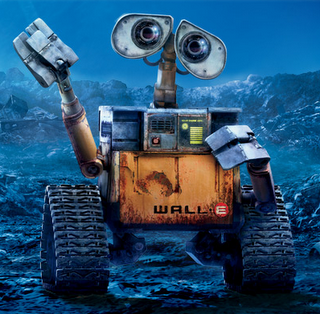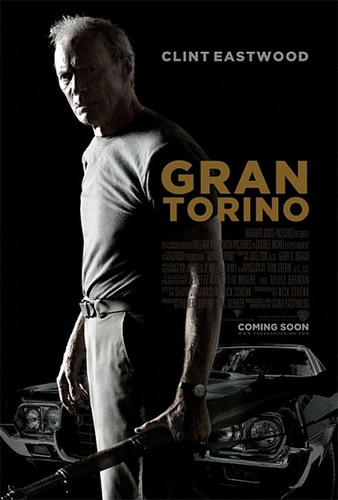You know what I noticed? Nobody panics when things go "according to plan"...even if the plan is horrifying. If, tomorrow, I told the press that, like, a gang-banger will get shot, or a truckload of soldiers will be blown up, nobody panics because it's all part of the plan.--The Joker
Those words are spoken at nearly the end of a lengthy stretch of The Dark Knight that, for me, is as perfect as a movie can be. I wasn't actually aware of how long that stretch was until I wound up with the Blu-ray disc a few weeks back, but I knew it began right around the party that the Joker crashes as he tries to pull a trifecta of murder and ended as the same shrewdly insane criminal walked away from his latest avenue of destruction in a nurse's outfit. Turned out that stretch is just about 75 minutes long, a good half of the very best film of 2008.
Only two films got as close in my mind to such perfection: WALL-E and The Wrestler. Unfortunately enough, only the former film has a section that still burns in the memory (although I've only just seen the latter and want it to continue simmering). Though some have laughed off the comparison of The Dark Knight to films such as Heat or The Godfather (though, let's be honest, that one is a hell of a stretch, and not one I'd make for the obvious reason and also, because...they're completely different animals), it's just as hard to compare this to Spider-Man or, God help me, Fantastic Four. The Dark Knight, at the end of the day, is a harder film to quantify in such simplistic terms.
Is it the greatest film ever, as some have professed? Well, of course not, and anyone who chooses to use such hyperbole about any film as it's being released is spouting lots of hot air (I'm looking at you, Rex Reed). But, as many smarter than myself have pointed out, some movies hit this country at the right time. The other film that's really hitting home for some people this year is Slumdog Millionaire, a vastly different picture, but one that masses are swarming to, in smaller numbers.
What's worth noting, though, is that within the span of under a year, Hollywood delivered two villains as memorable as Anthony Hopkins' Hannibal Lecter: Javier Bardem's Anton Chigurh in last year's best film, No Country For Old Men, and Heath Ledger's definitive version of The Joker. Like Lecter and Chigurh, the Joker doesn't hog the screen for the majority of the film, but just like them, he dominates, he permeates the proceedings. Though he hovers over Gotham like a wraith, the Joker is felt sometimes more than he is seen, and that's chiefly because Ledger's final complete performance works so well on so many levels. It's a credit to him that he's not only able to embody a character as far away from Ennis Del Mar, but he's able to make the Joker frightening, sympathetic, funny, cruel, and more without even having an arc.
Even in the film's slickly designed opening bank heist, when we barely see his face, when we're not even sure which clown mask is hiding his visage, the Joker captivates us. Director and co-writer Christopher Nolan, showing a massive amount of growth in talent here, deserves kudos for not making us question the logic of every one of the Joker's schemes, school buses and ferries alike. Questioning whether the plans (which the Joker does have many of, though he says otherwise in that scene quoted above) make sense is the wrong thing to do, not because the answer is, at best, a convoluted "Yes," but because the successful ride doesn't involve nitpicking. So it goes for any story, even the aforementioned Slumdog Millionaire; there's a point when you go along for the ride or you don't. In the feel-good India-set tale, it's when the million-dollar question is revealed; in this film, it's when the Joker gets away on his school bus after the successful heist. You buy it or you don't.
But in all the hullabaloo of Ledger (which would have been deserved if he were still alive, let it be said), we forget about Christian Bale, with less and more to do here. Less because Bruce Wayne's arc was mostly completed in Batman Begins, but more because he's got to be Batman, the real Bruce Wayne, and the public Bruce Wayne, sometimes in the evolution of one scene, as in that party crashing. Bale makes it looks so seamless that people almost ignored how solid a leading man he's become.
Fortunately, every other actor is given at least one moment to make a solid mark in our minds. Maggie Gyllenhaal, as the new Rachel Dawes, is flirty and feisty; though Katie Holmes wasn't nearly as accomplished, she had, ironically enough, more to do in the first of the series than Gyllenhaal gets to work with. Still, in her scenes with Bale, she's more tender, more human. Morgan Freeman gets to work his fatherly vibe as Lucius, the honorable elder of the Wayne enterprise who gets his faith rewarded, as Batman puts it, in one of the final shots. Still, his best scene is one of the funniest, where he plainly and calmly reminds a turncoat financial consultant exactly who he's trying to blackmail. Michael Caine, once again the trusty Alfred, proves that he's playing more than a butler, more than Michael Gough (certainly a fine actor delivering a fine performance in the Tim Burton version) was able to prove with his lesser material. His cunning and his sadly inevitable final decision help lend a realism to The Dark Knight, a realism not felt anywhere else in the iconography of the caped crusader.
The two actors, though, who slipped just under the radar are Gary Oldman and Aaron Eckhart, as Jim Gordon and Harvey Dent. Eckhart's more memorable performance, enhanced by his colorful transformation in the last hour, was strong; Oldman's is much, much stronger. Gordon is the real hero of the piece, mostly because he's not wearing a cape, because he doesn't triumph. Though he does save Batman from the Joker in the defining action showcase of the film, Gordon remains human in the final showdown with Two-Face, unable and unwilling to sacrifice his son's life for bravery. Yet the pride in his voice when he tells his son of his own derring-do, as he flashes back on the amount of skill involved in his own convoluted plot, is deserved and is what adds to the pain we share with Gordon in the climax.
Eckhart, though, does run the gamut of emotion in his role, even before he finally decides to give in to the dark side, as it were. If you were to listen to his impassioned cries as he realizes his true love's fate by themselves, it might seem comical. In the context of the film, in terms of how he grows and simultaneously devolves, the harshness in his voice even then wounds us. Dent's fall from cocky glory, seen in that first courtroom scene where he impresses even himself, is the only true connection to American jingoism of the past decade, if something from this film can even begin to compare to such a complex idea.
That such ideas can even be thought of in connection with The Dark Knight is praise enough, even if Nolan and his brother, Jonathan (the other writer) had no intention of making a connection, or nothing as deep. Some looked at Batman as either a condemnation of or compliment to the Bush years, but it's doubtfully accurate. Yes, torture and terrorism are hot topics in the film, but Nolan did honestly profess to wanting to make a damn good blockbuster, chiefly, and he has succeeded.
The requisite ending to any review of this film must, I suppose, come back to Ledger, but let me do so by starting a tangent of sorts. As I sat through the final half-hour of Gran Torino, I reflected on the notion that Clint Eastwood may retire officially from directing and acting soon. I thought and still pray that Gran Torino is not his last film. It's not the movie I'd want Eastwood, a legend for many good reasons, to go out on. Not the man behind the Man With No Name, Dirty Harry, and Unforgiven. I was no fan of Changeling, but it was still filled with more skill than Eastwood's recent affair.
The reason for my hope is obvious: whenever the sad day comes that Clint Eastwood passes on from this world, there will be some mention of his last film. I wouldn't want his last film to be a black mark, a movie people will not look back on with at least some fondness. So many actors and directors, people of unquestionable talent, end their careers on low notes; few are lucky enough to have had a full career with few or no bad films, or at least not enough to forget the classics. Eastwood may still be lucky enough to hit one final home run, or at least a triple, but it will have to come in the future.
Heath Ledger, who was not as lucky as Eastwood in having a full life on screen, left too early. This much is obvious. But when I left The Dark Knight the first time, as my wife quietly remarked on her depression that she'd never see Ledger onscreen again, I smiled on the inside. His talent was still untapped, his star would have grown in ways we'll never know, but I was and still remain thrilled at this lasting, for-the-ages performance, one that will haunt and excite millions for years and years. Though there may be initial disappointment that the Joker will never again rouse us past hanging precariously upside-down on an unfinished skyscraper, he is reborn and firmly defined here, as is the entire Batman mythos, in a film as realistic and charged as the best crime epics are.
Four stars out of four
















